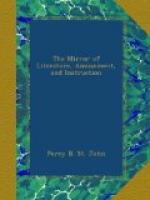* * * * *
SPIRIT OF THE PUBLIC JOURNALS.
* * * * *
THE FIRST AND LAST APPEARANCE.
Mr. Henry Augustus Constantine Stubbs (or as he distinguished himself on his new visiting cards, H.A.C. Stubbs) had taken up his abode in one of the demi-fashionable squares, among judges, physicians, barristers, and merchants, at the north side of the metropolis. Being the only lawfully begotten issue of his father, when the frail Angelina made it impossible he should have any brothers and sisters, he succeeded, by will, to three-fourths of the late Mr. Jonathan Stubbs’s property, and, by oxalic acid, to the remaining fourth;[5] the affair being too sudden to permit of any further testamentary dispositions, or of any of those benevolent codicils, which sometimes have the effect of tapering down primary bequests, like Prior’s Emma, “fine by degrees and beautifully less.” Upon a fair computation, after a few trifling legacies were paid, and all debts satisfied, young Mr. Stubbs might calculate his inheritance, in India stock, Bank stock, houses, canal shares, and exchequer bills, at nearly eighty thousand pounds.
[5] Mr. Jonathan Stubbs retired
from business long before he reached
his grand
climacteric, to his country house at Newington Butts,
with the
solid dignity of at least half a plum. What length
of
years might
have been in store for him, if he had regularly taken
Dr. James’s
analeptic pills, it is impossible to say; but not doing
so, he had
occasion to send the coachman one night for an ounce
of
Epsom salts.
They proved to be oxalic acid; and stomach-pumps not
being then
in existence, there was an inevitable termination to
the
existence
of Mr. Stubbs. An “extraordinary sensation,”
as the
newspapers
have it, was produced in Newington Butts by this
dreadful
catastrophe.
His education had not been neglected; that is to say, his father sent him, at nine years old, to one of those suburban seminaries for “young gentlemen,” usually kept by elderly gentlemen, who know what it is to have been deprived of similar advantages in their own youth. They feel, therefore, a laudable gratification in enabling the rising generation to pluck some of that fruit from the tree of knowledge which they themselves never tasted at all. Here he remained till he was nearly seventeen; and here he acquired a little French, a little Greek, a little Latin, a little mathematics, a little logic, and a little geography, “with the use of the globes.” In short, he brought away with him a little learning, for the obtaining of which his father had not paid a little money. He subsequently enlarged his Lilliputian stock of ideas, by assiduously prosecuting his studies at home, three days a-week, and three hours




